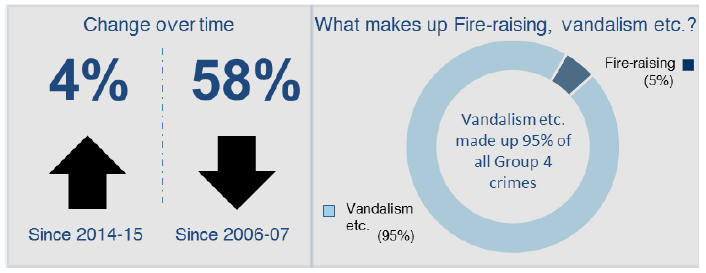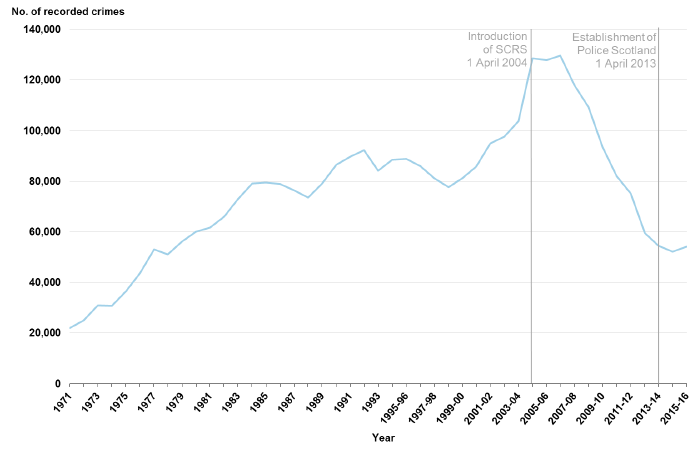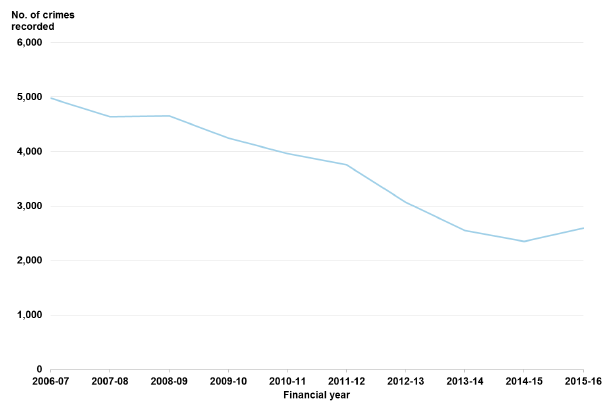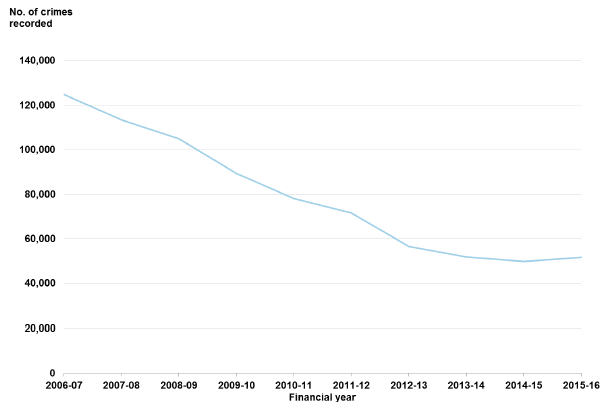Recorded Crime in Scotland, 2015-16
Statistics on crimes and offences recorded and cleared up by the police in Scotland.
This document is part of a collection
Group 4 - Fire-raising, Vandalism etc.

Number of crimes of Fire-raising, vandalism etc. recorded in 2015-16:
Fire-raising, vandalism etc. accounted for 22% of all crime recorded in Scotland in 2015-16. Between 2014-15 and 2015-16, the number of crimes of Fire-raising, vandalism etc. recorded by the police in Scotland increased by 4%, from 52,091 to 54,226.
Chart 12 shows the number of crimes of Fire-raising, vandalism etc. from 1971 onwards. Levels of Fire-raising, vandalism etc. increased for a long period, but have been on a sharp downward trend since they peaked in 2006-07. Despite this year's increase, these crimes have reduced by 58% since 2006-07.
Chart 12: Crimes of Fire-raising, vandalism etc. recorded by the police, 1971 1 to 1994 then 1995‑96 to 2015-16 ( Table 10 )

1. Crimes recorded for the present crime groups are not available prior to 1971.
The national rate of recorded crimes of Fire-raising, vandalism etc. increased from 97 per 10,000 population in 2014-15 to 101 crimes per 10,000 population in 2015-16. Rates varied by local authority area, with the highest in Clackmannanshire (140 per 10,000 population), and the lowest in Na h-Eileanan Siar (41 per 10,000 population) ( Table 13).
Due to the difference in scale of recorded crimes of Vandalism etc. and Fire-raising, Charts 13 and 14 show these two categories separately to highlight better the similar downward trends they have followed over the last ten years.
Chart 13: Fire-raising in Scotland, 2006-07 to 2015-16

Chart 14: Vandalism etc. in Scotland, 2006-07 to 2015-16

Vandalism etc.:
Vandalism etc. accounted for over 95% of crimes of Fire-raising, vandalism etc. These crimes have increased by 4% from 49,740 in 2014-15 to 51,631 in 2015-16, in contrast to the downward trend seen since 2006-07, resulting in a large decrease of 59% over this ten year period.
All local authority areas recorded a decrease in this category over the ten year period. Between 2014-15 and 2015-16, over two thirds (23) of local authorities showed an increase.
The Vandalism etc. category includes crimes recorded under the Computer Misuse Act 1990. There were 31 such crimes recorded in 2015-16, accounting for less than 1% of all crimes of Vandalism etc.
Fire-raising:
Fire-raising accounted for less than 5% of crimes of Fire-raising, vandalism etc. These crimes have increased by 10% from 2,351 in 2014-15 to 2,595 in 2015-16, in contrast to the downward trend seen since 2008-09. Fire-raising has decreased by 48% over the ten year period from 2006-07 to 2015-16.
All but one local authority area recorded a decrease in this category over the ten year period. Between 2014-15 and 2015-16, around two thirds (21) of local authorities showed an increase.
DATA VALIDATION
HMICS Crime Audit 2016
As previously mentioned, HMICS tested the accuracy of crime recording through auditing a sample of records recorded between 1 st January and 31 st March 2016. Further information on this audit, including definitions of terminology and tests used can be found in Annex 2.
Of the 1,938 crimes sampled that resulted from damage-related incidents, 96.0% were counted and classified correctly. The audit found 44 crimes were under-counted and 11 were over-counted. The audit noted that the vast majority of under-counted crimes were vandalisms, for example where a person reported a vandalism to the police and highlighted that the same incident had occurred recently, or had also happened to their neighbour. In this circumstance an additional crime should have been recorded. Most over-counted crimes were also vandalisms, and these occurred when the vandalism could have been subsumed [10] into another crime. The audit also found 22 classification errors, the majority relating to crimes being classified as vandalisms when they were a different crime such as culpable and reckless conduct, theft or an attempted housebreaking.
Of the 2,032 damage-related incidents [11] audited, 94.9% were closed correctly. Errors in this area were often due to a lack of information to dispel an allegation of criminality, or a lack of follow up with a minor incident not being attended or followed up by telephone.There were also several errors involving non-cooperative complainers, as well as difficulties in re-contacting complainers, which led to incidents being incorrectly closed.
DATA COMPARISONS
This segment includes information that should be considered to widen contextual understanding of the data provided on Group 4 - Fire-raising, vandalism etc. Detail is provided on the number of fires which are attended to by the Scottish Fire and Rescue service, as well as analysis from the Scottish Crime and Justice Survey ( SCJS) to provide a complementary outlook on vandalism in Scotland.
Fire and Rescue Statistics Scotland
As highlighted above, there has been a 48% reduction in the number of fire-raising crimes recorded by the police between 2006-07 and 2015-16, from 4,976 to 2,595. Another source of statistics on fire in Scotland is an annual publication covering the number of fires attended by the Scottish Fire and Rescue Service ( SFRS). The latest figures (for 2014-15) are available at: http://www.firescotland.gov.uk/about-us/fire-and-rescue-statistics.aspx.
It is not possible to make direct comparisons between the two sources, as many fires are caused accidentally rather than as a result of a crime, and the police are not called to all deliberate fires. Furthermore, not all police recorded crimes of fire-raising may result in the attendance of the SFRS (for example the fire may have ended before the police attended). However as these sources both relate to how Scotland's emergency services respond to fire, it would be anticipated that both should show similar trends over time.
A total of 25,002 fires were attended by the SFRS in 2014-15, of which over 13,500 were started deliberately. This represents a 49% reduction in the total number of fires attended since 2006-07 and a 41% reduction in the number of deliberate fires since 2009-10 (the first year for which comparable data are available). This comparison confirms that the significant reduction in police recorded crimes of fire-raising over the past 10 years has also been broadly reflected in statistics for the SFRS.
Scottish Crime and Justice Survey ( SCJS)
In addition to the information on police recorded crime, the SCJS provides a complementary outlook through asking respondents about their experiences of vandalism in Scotland.
A more detailed examination of comparisons between the SCJS and recorded crime is made within Chapter 5.
Key points from the Scottish Crime and Justice Survey:
As stated earlier, of the 688,000 crimes measured by the SCJS in 2014-15, 502,000 (73%) were property crimes and it is estimated that around 13% of adults in Scotland were a victim of property crime in 2014-15.
In 2014-15, vandalism accounted for 36% of property crime, followed by other household theft (including bicycle theft, 31%), personal theft (excluding robbery, 21%), all motor vehicle theft related incidents (8%) and housebreaking (4%).
Further detail on the comparable crime group is available in Section 5.3 and in the Annex of the 2014-15 SCJS. Vandalism is included in recorded crime figures within Group 4 (Fire-raising, vandalism etc).
As outlined in Section 5.3, recorded vandalism in the comparable category decreased by 53% between 2008-09 and 2014-15, while for the same period the SCJS estimates of vandalism decreased by 49% (a statistically significant change in the SCJS results).
Contact
There is a problem
Thanks for your feedback